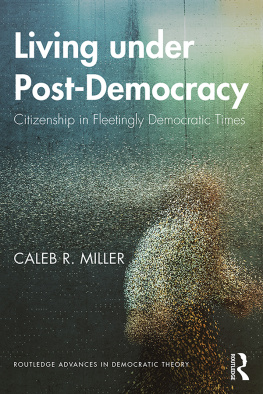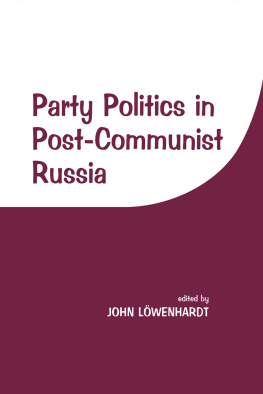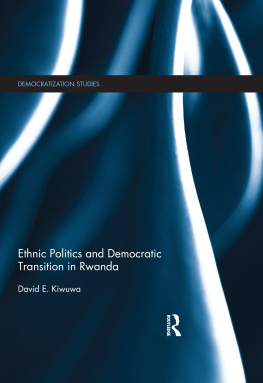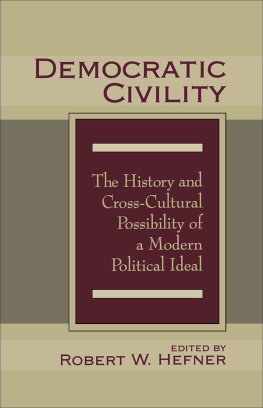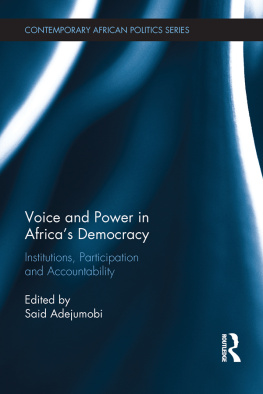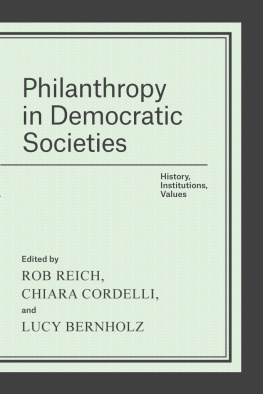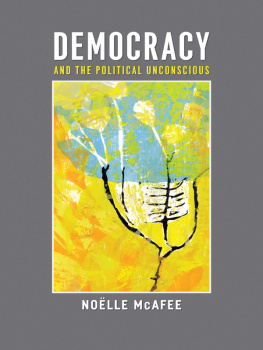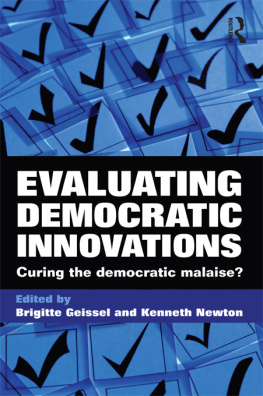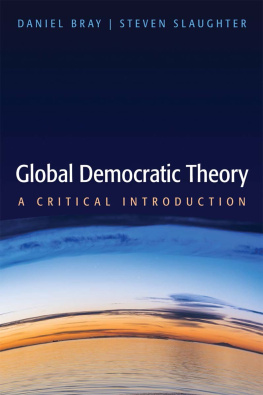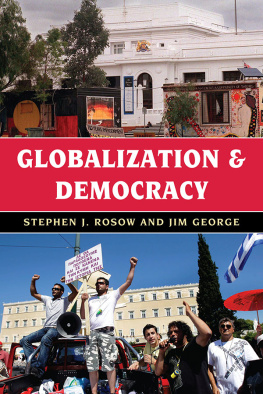Miller is laser focused on confronting the problem that democratic societies fall well short of the longstanding ideals that have informed them. In developing the provocative idea of Post-Democracy to orient us within this situation, Miller advances the study of democracy.
Jeffrey E. Green, University of Pennsylvania
Unlike those who say Dont vote! It only encourages them, Caleb Miller does not want us to abandon taking part in political activity, even though he believes it is largely illusory. Should we do this only to continue mourning the absence of effective democracy? Or will our actions from time to time ignite a spark of real possibilities? Millers rich ambiguity makes us think for ourselvesthe best success an author can have.
Colin Crouch, author of Post-Democracy and Post-Democracy after the Crises
Living under Post-Democracy
When money equates to power and the system is rigged in favor of wealthy elites, why do we still pretend we are living in a democracy? In Living under Post-Democracy, Caleb R. Miller challenges us to admit what we already know: that most of us are effectively powerless over the political decisions that govern our lives. Instead, we should embrace a post-democratic view of politics, one which recognizes the way in which our political institutions failboth systematically and historicallyto live up to our democratic ideals, while also acknowledging our tragic, yet enduring attachment to them both.
Offering a new framework for conceptualizing contemporary citizenship, Miller explores how a post-democratic perspective can help us begin to reorient ourselves in our paradoxical, fractured political landscape. This model of citizenship opens the possibility for a distinctly post-democratic approach to both political participation and political philosophy, treating them not as ways of affecting politics, but as opportunities for therapeutically engaging with the ongoing challenges and inevitable frustrations of post-democratic life.
This book is an excellent addition to courses on democratic theory, as well as introductory courses to political theory.
Caleb R. Miller is a Visiting Fellow at the Ash Center for Democratic Goverance and Innovation at the Harvard Kennedy School. He has published in Constellations, Hobbes Studies, and the Journal of Political Science Education. In addition to his work on post-democracy, his research interests include democratic realism, political realism, and the work of Thomas Hobbes. Miller received his PhD from the University of California, Santa Barbara; he currently resides in Somerville, MA with his wife and son.
ROUTLEDGE ADVANCES IN DEMOCRATIC THEORY
Edited by Paulina Tambakaki (University of Westminster), Lasse Thomassen (Queen Mary, University of London) and David Chandler (University of Westminster)
Advisory Board: Amy Allen (Penn State University), Benjamin Barber (City University of New York), Rajeev Bhargava (Centre for the Study of Developing Societies), Fred Dallmayr (University of Notre Dame), John Keane (University of Sydney), James R. Martel (San Francisco State University), Chantal Mouffe (University of Westminster), Davide Panagia (UCLA), Bhikhu Parekh (House of Lords), and Nadia Urbinati (Columbia University)
Democracy is being re-thought almost everywhere today: with the widespread questioning of the rationalist assumptions of classical liberalism, and the implications this has for representational competition; with the Arab Spring, destabilizing many assumptions about the geographic spread of democracy; with the deficits of democracy apparent in the Euro-zone crisis, especially as it affects Greece and Italy; with democracy increasingly understand as a process of social empowerment and equalization, blurring the lines of division between formal and informal spheres; and with growing demands for democracy to be reformulated to include the needs of those currently marginalized or even to include the representation of non-human forms of life with whom we share our planet.
Routledge Advances in Democratic Theory publishes state of the art theoretical reflection on the problems and prospects of democratic theory when many of the traditional categories and concepts are being reworked and rethought in our globalized and complex times.
The series is published in cooperation with the Centre for the Study of Democracy, University of Westminster, London, UK.
11. Agonistic Democracy
Rethinking Democratic Institutions in Pluralist Times
Marie Paxton
12. Living under Post-Democracy
Citizenship in Fleetingly Democratic Times
Caleb R. Miller
For more information about this series, please visit: www.routledge.com/Routledge-Advances-in-Democratic-Theory/book-series/RADT
First published 2020
by Routledge
52 Vanderbilt Avenue, New York, NY 10017
and by Routledge
2 Park Square, Milton Park, Abingdon, Oxon OX14 4RN
Routledge is an imprint of the Taylor & Francis Group, an informa business
2020 Taylor & Francis
The right of Caleb R. Miller to be identified as author of this work has been asserted by him in accordance with sections 77 and 78 of the Copyright, Designs and Patents Act 1988.
All rights reserved. No part of this book may be reprinted or reproduced or utilised in any form or by any electronic, mechanical, or other means, now known or hereafter invented, including photocopying and recording, or in any information storage or retrieval system, without permission in writing from the publishers.
Trademark notice: Product or corporate names may be trademarks or registered trademarks, and are used only for identification and explanation without intent to infringe.
Library of Congress Cataloging-in-Publication Data
Names: Miller, Caleb R., author.
Title: Living under post-democracy : citizenship in fleetingly democratic times / Caleb R. Miller.
Description: New York, NY : Routledge, 2020. |
Series: Routledge advances in democratic theory ; 12 | Includes bibliographical references and index.
Identifiers: LCCN 2019053691 (print) | LCCN 2019053692 (ebook) | ISBN 9780367322335 (hardback) | ISBN 9780367322342 (paperback) | ISBN 9780429317446 (ebook) | ISBN 9781000034868 (adobe pdf) | ISBN 9781000034882 (mobi) | ISBN 9781000034905 (epub)
Subjects: LCSH: Citizenship. | Political participation. | Democracy.
Classification: LCC JF801 .M548 2020 (print) | LCC JF801 (ebook) | DDC 323.6--DC23
LC record available at https://lccn.loc.gov/2019053691
LC ebook record available at https://lccn.loc.gov/2019053692
ISBN: 978-0-367-32233-5 (hbk)
ISBN: 978-0-367-32234-2 (pbk)
ISBN: 978-0-429-31744-6 (ebk)
To my wife and son, who make it all worthwhile
I am indebted to a host of friends, family, and colleagues, without whom this book would not have been possible. First among them are Andrew Norris, P.E. Digeser, and M. Stephen Weatherford, whose endless support and encouragement, even (or perhaps especially) when skeptical of my position, enabled me to grow both as a writer and scholar in ways that I could have never realized alone. Each read and commented on several early drafts of these chapters, and while all mistakes remain my own, any insight this work offers is in large part due to their thoughtful interventions and the ongoing questions they inspire. To that end, I must also thank Bruce Bimber, Thomas Carlson, Joshua Foa Dienstag, Thomas Hughes, and M. Kent Jennings for their invaluable instruction, commentary, and latent contributions to this book. As this is my first book, I want to further recognize a number of early mentors and exemplars, who, in ways both subtle and profound, contributed to my ability to write this book, including Nancy Armstrong, David Bering-Porter, Chad Cyrenne, Bernard Harcourt, Marissa Guerrero, Bernard Reginster, and Ellen Rooney. In particular, I want to thank Corey D. B. Walker, J. Michael Silverman, and Michael Gottsegen for guiding my first serious scholarly effort over a decade ago, and Benjamin Jewell, for inspiring my initial (and enduring) fascination with politics and political philosophy.

